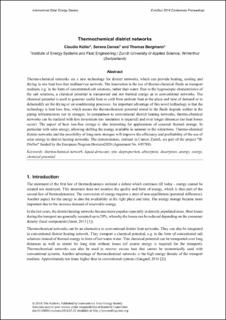Please use this identifier to cite or link to this item:
https://doi.org/10.21256/zhaw-3316| Publication type: | Conference paper |
| Type of review: | Peer review (abstract) |
| Title: | Thermo-chemical district networks |
| Authors: | Koller, Claudio Danesi, Serena Bergmann, Thomas |
| DOI: | 10.18086/eurosun2018.05.02 10.21256/zhaw-3316 |
| Proceedings: | Proceedings of the 12th International Conference on Solar Energy for Buildings and Industry (EuroSun2018) |
| Conference details: | 12th International Conference on Solar Energy and Buildings (EuroSun 2018), Rapperswil, 10-13 September 2018 |
| Issue Date: | 2018 |
| Publisher / Ed. Institution: | International Solar Energy Society |
| Publisher / Ed. Institution: | Freiburg |
| ISBN: | 978-3-9820408-0-6 |
| Language: | English |
| Subjects: | Thermochemical network; Liquid desiccant; Syn-disproportion; Absorption; Desorption; Anergy; Exergy; Chemical potential |
| Subject (DDC): | 660: Chemical engineering |
| Abstract: | Thermo-chemical networks are a new technology for district networks, which can provide heating, cooling and drying in one heat loss-free multiservice network. The innovation is the use of thermo-chemical fluids as transport medium, e.g. in the form of concentrated salt solutions, rather than water. Due to the hygroscopic characteristics of the salt solutions, a chemical potential is transported and not thermal energy as in conventional networks. The chemical potential is used to generate useful heat or cold from ambient heat at the place and time of demand or to dehumidify air for drying or air conditioning processes. An important advantage of this novel technology is that the technology is heat loss-free, which means the thermochemical potential stored in the fluids degrade neither in the piping infrastructures nor in storages. In comparison to conventional district heating networks, thermo-chemical networks can be realized with less investment (no insulation is required) and over longer distances (no heat losses occur). The aspect of heat loss-free storage is also interesting for applications of seasonal thermal storage. In particular with solar energy, allowing shifting the energy available in summer to the wintertime. Thermo-chemical district networks and the possibility of long-term storages will improve the efficiency and profitability of the use of solar energy in district heating networks. The demonstrators, realised in Canton Zurich, are part of the project "H-DisNet" funded by the European Program Horizon2020 (Agreement No. 695780) |
| URI: | https://digitalcollection.zhaw.ch/handle/11475/16667 |
| Fulltext version: | Published version |
| License (according to publishing contract): | Licence according to publishing contract |
| Departement: | School of Engineering |
| Organisational Unit: | Institute of Energy Systems and Fluid Engineering (IEFE) |
| Appears in collections: | Publikationen School of Engineering |
Files in This Item:
| File | Description | Size | Format | |
|---|---|---|---|---|
| eurosun2018-0082-Koller.pdf | 1.11 MB | Adobe PDF |  View/Open |
Show full item record
Koller, C., Danesi, S., & Bergmann, T. (2018). Thermo-chemical district networks. Proceedings of the 12th International Conference on Solar Energy for Buildings and Industry (EuroSun2018). https://doi.org/10.18086/eurosun2018.05.02
Koller, C., Danesi, S. and Bergmann, T. (2018) ‘Thermo-chemical district networks’, in Proceedings of the 12th International Conference on Solar Energy for Buildings and Industry (EuroSun2018). Freiburg: International Solar Energy Society. Available at: https://doi.org/10.18086/eurosun2018.05.02.
C. Koller, S. Danesi, and T. Bergmann, “Thermo-chemical district networks,” in Proceedings of the 12th International Conference on Solar Energy for Buildings and Industry (EuroSun2018), 2018. doi: 10.18086/eurosun2018.05.02.
KOLLER, Claudio, Serena DANESI und Thomas BERGMANN, 2018. Thermo-chemical district networks. In: Proceedings of the 12th International Conference on Solar Energy for Buildings and Industry (EuroSun2018). Conference paper. Freiburg: International Solar Energy Society. 2018. ISBN 978-3-9820408-0-6
Koller, Claudio, Serena Danesi, and Thomas Bergmann. 2018. “Thermo-Chemical District Networks.” Conference paper. In Proceedings of the 12th International Conference on Solar Energy for Buildings and Industry (EuroSun2018). Freiburg: International Solar Energy Society. https://doi.org/10.18086/eurosun2018.05.02.
Koller, Claudio, et al. “Thermo-Chemical District Networks.” Proceedings of the 12th International Conference on Solar Energy for Buildings and Industry (EuroSun2018), International Solar Energy Society, 2018, https://doi.org/10.18086/eurosun2018.05.02.
Items in DSpace are protected by copyright, with all rights reserved, unless otherwise indicated.